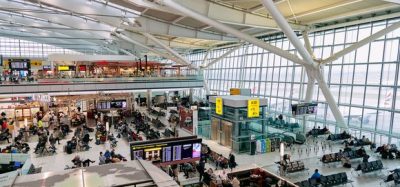Drone Series: Today sees no-fly zone extended around UK airports
- Like
- Digg
- Del
- Tumblr
- VKontakte
- Buffer
- Love This
- Odnoklassniki
- Meneame
- Blogger
- Amazon
- Yahoo Mail
- Gmail
- AOL
- Newsvine
- HackerNews
- Evernote
- MySpace
- Mail.ru
- Viadeo
- Line
- Comments
- Yummly
- SMS
- Viber
- Telegram
- Subscribe
- Skype
- Facebook Messenger
- Kakao
- LiveJournal
- Yammer
- Edgar
- Fintel
- Mix
- Instapaper
- Copy Link
Posted: 13 March 2019 | International Airport Review | No comments yet
As of today, the 13 March 2019, no-fly zones around UK airports have been extended to five kilometres to try and mitigate the impact rogue drones have upon an airspace.


Following the chaos drones recently caused at Gatwick and Heathrow, the UK government has decided to extend no-fly zones around airfields to reduce the impact these incursions have. As of today, the zone extends to five kilometres. This comes as over 120 near-misses were reported between drones and aircraft on 2018 according to the UK Airprox Board.
The government has acted to bring the law change in ahead of a new Drones Bill which will give police significantly increased powers to deal with those using drones illegally. Penalties for breaking the law on misusing drones range from fines to life imprisonment if the device is intentionally used to cause violence.
Drone users can only fly within the restriction zones if they have the correct permission from air traffic control or the airport.
On the 20 March 2019, the Aviation Minister Baroness Liz Sugg will meet with global leading drone manufacturers to discuss how to tackle criminal drone use. They are expected to discuss a range of topics including counter-drone technology and software – such as ‘geofencing’ – that could be built into drones at the point of manufacture.
Transport Secretary, Chris Grayling, said: “The UK has been consistently at the forefront of legislation to tackle drone misuse. All drone users should be aware that flying a drone within five kilometres of an airport or over 400ft is a serious criminal act, one which could put lives at risk and risks penalties ranging from significant fines to a life sentence.”
The UK Civil Aviation Authority’s code of conduct, the Dronecode, sets out existing regulations for drone users, which include staying below 122m (400ft) and flying at least 50m (164ft) away from buildings and people.
Aviation Minister, Baroness Liz Sugg, said: “Flying drones illegally puts others at risk both in the air and on the ground, so it’s vital they are used safely. The majority of people using drones want to do so responsibly, so we have expanded a national campaign to ensure they know the rules – and the penalties. The new Drones Bill, which is currently being drafted, will give new powers to the police to clamp down on those misusing drones and other small unmanned aircraft – including the power to access electronic data stored on a drone with a warrant. It will also include stop and search powers for drone users near aerodromes.”
The Home Office is also reviewing the UK’s approach to countering the malicious use of drones, and will consider how best to protect the full range of the UK’s critical national infrastructure – including testing and evaluating technology to counter drones.
Related topics
Airside operations, Drones, Passenger experience and seamless travel, Regulation and Legislation, Safety
Related airports
Related organisations
Civil Aviation Authority (CAA), Department for Transport (DfT), UK Airprox Board


















